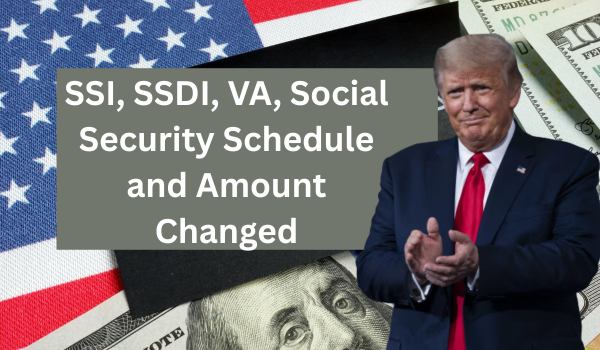Millions of Americans need to stay updated about the SSI, SSDI, VA, and Social Security schedule and amount changes so they don’t miss out on money they rely on every month.
SSI, SSDI, VA, Social Security Schedule and Amount Changed
Every year, Social Security and related benefit programs see updates to payment schedules, benefit amounts, and eligibility rules. For 2025, several important changes have taken effect that impact those receiving Supplemental Security Income (SSI), Social Security Disability Insurance (SSDI), Veterans Affairs (VA) benefits, or regular Social Security retirement checks. Knowing exactly what’s changed can help you plan your budget and avoid unpleasant surprises when your payment arrives.
Why the changes this year?
The cost of living continues to rise across the country. In response, the Social Security Administration (SSA) and the Department of Veterans Affairs have made adjustments to help recipients keep up. The annual Cost-of-Living Adjustment (COLA) affects how much you receive, while tweaks to the payment schedule are meant to make distribution smoother.

In addition, some changes are designed to modernize payment processes, reduce delays, and fix past backlogs caused by administrative issues during the pandemic.
Changes in payment amounts for 2025
One of the biggest updates is the 2025 COLA increase. This year, benefits went up by about 3.2%, slightly lower than the 8.7% boost in 2023 but still meaningful for seniors and disabled Americans struggling with rising rent, food, and utility costs.
Here’s an idea of what this means in real dollars:
| Program | Average Monthly Payment 2024 | New Average 2025 |
|---|---|---|
| SSI | $943 | $973 |
| SSDI | $1,537 | $1,586 |
| Social Security (retirement) | $1,845 | $1,904 |
| VA Disability (50% rating) | $1,041 | $1,074 |
Keep in mind that your personal amount depends on your work history, disability rating, income, and family situation. Married couples on SSI, for example, will see slightly larger combined increases.
Updates to the payment schedule
Many recipients may not realize that the payment schedule has also shifted slightly. Here’s what you need to know:
- Social Security payments are still sent out based on your birth date, but there are slight changes to the payment week to avoid holiday-related delays.
- SSI payments usually arrive on the first of the month. If the first falls on a weekend or holiday, the payment comes on the prior business day.
- SSDI follows the birth date rule, but some people who receive both SSDI and SSI might now see two deposits instead of one combined payment, depending on their bank or direct deposit setup.
- VA benefits continue to arrive on the first business day of the month, but some veterans are seeing earlier deposits if their bank releases funds ahead of schedule.
If you rely on these payments to cover rent or bills, it’s smart to review the updated 2025 payment calendar on the SSA and VA websites so you’re not caught off guard.
Direct deposit and mailing changes
A growing number of beneficiaries are being moved to direct deposit, with the SSA and VA encouraging people to set up electronic payments. Paper checks can still be requested, but delays are more common.
For those who receive checks, make sure your address is correct to prevent missed or delayed payments. Lost or stolen checks can take weeks to replace.
Tips to manage these changes
If you depend on SSI, SSDI, VA, or Social Security, here’s what you should do now to stay on top of the new rules:
- Log into your My Social Security or VA online account and check your benefit amount.
- Mark the new payment dates on your calendar.
- Sign up for direct deposit if you haven’t already.
- Check that your address and bank information are current.
- Watch out for scam calls or emails claiming to offer faster payments for a fee — the SSA and VA never charge for processing your benefits.
If you believe your payment amount is wrong or didn’t arrive on time, contact Social Security or Veterans Affairs right away. Keep your award letters and statements handy in case you need to dispute anything.
Staying ahead
Knowing about these changes now means you can better manage your household budget and avoid panic if your payment arrives a few days earlier or later than expected.
The small yearly increases help, but it’s wise to plan for rising costs and explore extra support like Supplemental Nutrition Assistance Program (SNAP) benefits, housing aid, or local food banks if your benefits alone aren’t enough.
Keeping informed and organized is the best way to protect your income and your peace of mind.
Staying alert and updated helps you make the most of the money you’ve earned and deserve




